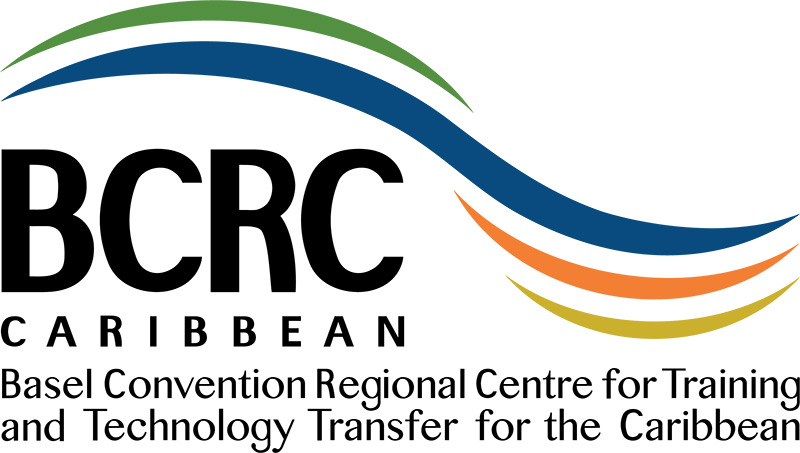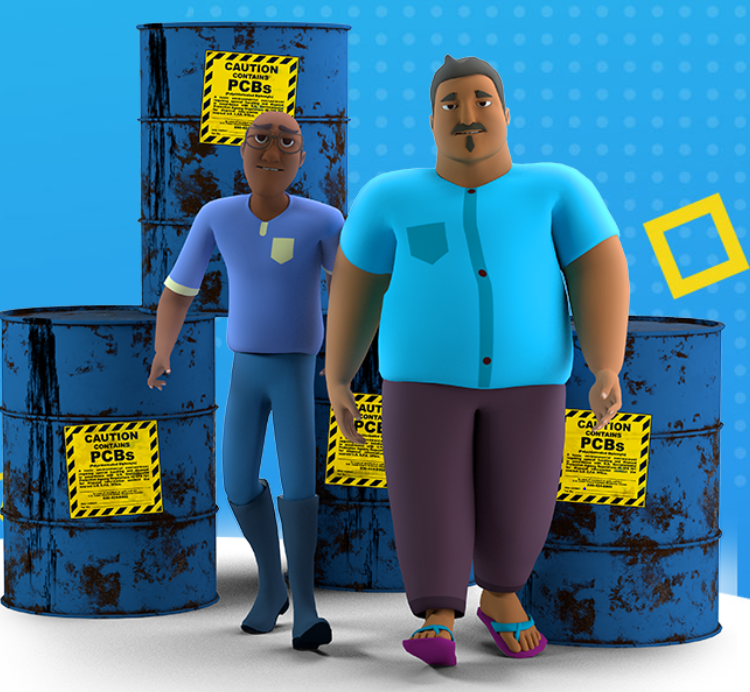The Problem
Persistent Organic Pollutants Management in the Caribbean
Persistent Organic Pollutants (POPs) are a group of toxic organic chemicals commonly found in some household products and chemicals, industrial chemicals and waste disposal sites and which have negative effects on human health and long-term wellness and the environment. Once released into the environment, these chemicals remain intact for long periods of time and become widely distributed geographically.
Sound management of chemicals and wastes containing POPs is a challenge for the Caribbean where increased consumerism and a shift in regional economies from agriculture to tourism and industrial economies have resulted in greater usage of these chemicals and the generation of larger, more complex categories of solid, hazardous and chemical wastes containing POPs. Further challenges surround the lack of capacity and infrastructure to support the environmentally sound management, treatment and disposal of POPs related hazardous waste streams. Furthermore, the low level of awareness on the dangers of POPs by the public and other key agencies adds to the region’s challenges with effectively reducing and eliminating the threats of POPs.
Brominated Flame Retardants (PBDEs and HBCD)
Polychlorinated Biphenyls (PCBs)
POPs Pesticides
Substances or chemicals added to some consumer products to reduce flammability or to slow the spread of fire. PBDEs and HBCD may be included in products such as: plastic casings of some electronics, plastics and foams of vehicles (manufactured pre-2004), polyurethane foams in furniture, etc.
Man-made organic chemicals manufactured from 1929 to 1979 and used in hundreds of industrial and commercial applications. PCBs may be found in: transformers and capacitors, some old electrical equipment, devices and appliances containing PCB capacitors and emissions from the burning of copper cables.
The production and use of sixteen (16) POPs containing pesticides historically used on farms and in home gardens are to be eliminated as per the Stockholm Convention. These include pesticides such as: Aldrin, DDT, Lindane and Mirex.
Perfluorooctane-sulfonic Acid (PFOS)
Unintentional Persistent Organic Pollutants (UPOPs)
Find out how to Stop the POPs!
Man-made chemicals used in a range of common household products due to its resistance to natural degradation and its ability to repel oil, grease and water. PFOS may be found in: some firefighting foams, stain-resistant carpets, non-stick pans/utensils, cardboard boxes and greaseproof packaging.
Emitted as the by-products of chemical or combustion processes involving organic matter and chlorine or as the by-products of manufacturing other chemicals. UPOPs include: dioxins, furans, HCB, HCBD, PeCB, PCBs and PCNs.
Visit the BCRC-Caribbean’s website, www.stopthepops.com to learn more about Persistent Organic Pollutants (POPs), their sources, their effects on human health and the environment and what you can do to Stop the POPs. Find videos, brochures, games and more!
POPs Projects in the Caribbean
Participating Countries
Antigua and Barbuda, Barbados, Belize, Saint Kitts and Nevis, Saint Lucia, Saint Vincent and the Grenadines, Suriname, Trinidad and Tobago.
Project Aim
The five-year Project "Development and Implementation of a Sustainable Management Mechanism for Persistent Organic Pollutants (POPs) in the Caribbean” was launched in 2015 with the aim of enabling the participating countries to reduce and eliminate the threats of POPs. The regional approach is intended to build institutional and human resource capacity to deal with the impacts of POPs and unintentionally produced POPs (uPOPs) in eight of the Caribbean countries who are Parties to the Stockholm Convention.
The Project is implemented by the United Nations Industrial Development Organization (UNIDO) with the Basel Convention Regional Centre for Training and Technology Transfer for the Caribbean (BCRC-Caribbean) as the regional executing agency, with a financial grant provided by the Global Environment Facility (GEF).
Project Components
- Component 1: Create the enabling mechanisms in the Caribbean for effective implementation of the Stockholm Convention on POPs
- Component 2: Reduce UPOPs emissions by improving poor waste management practices at landfills
- Component 3: Assess potential contaminated sites to determine the level of contamination by POPs and develop appropriate remediation strategies
- Component 4: Manage and dispose of PCBs (ANU, BZE, SLU, SUR)
- Component 5: Impact Monitoring and Evaluation
For more information on the project's outputs, see the Project Implementation Framework Document and other details on the project page on the GEF Website.
Project Activities and Results
The status of Project Activities will be continually updated throughout the duration of the Project.
|
Activity |
Status |
|
Component 1: Enabling mechanism for effective implementation of the Stockholm Convention on Persistent Organic Pollutants created |
|
| National Implementation Plans |
|
| Model Regional Integrated Chemicals Management Act |
|
| POPs Regional Information System |
|
| Public Awareness and Education Strategy |
|
| Technical Training Activities |
|
|
Component 2: UPOPs Reduction through improvement of landfill operations ANU, BDOS, SLU, SKN, SVG |
|
| Training Needs and Baseline Assessments |
|
| Training of landfill operators |
|
| Development of source segregation strategies and pilot projects |
|
| Design of Hazardous Waste Storage Facilities |
|
|
Component 3: Identification and remediation of contaminated sites |
|
| Develop an inventory of all potential contaminated sites in each country |
|
| Select 1-5 priority sites for preliminary site and risk assessments |
|
| Conduct preliminary site assessments for each of the 1.5 priority sites and preparation of final report |
|
|
Component 4: PCB Management and Disposal in ANU, BZE, SLU, SUR |
|
| Assess inventories and upgrade laboratory capacities |
|
| Develop PCB Phase-Out plan |
|
| Consolidate, package and label PCBs wastes |
|
Articles and Resources
Stop the POPs Website Stockholm Convention Website Moving the waste and chemicals management agenda forward in the Caribbean
Background
Guyana acceded to the Stockholm Convention (SC) in 2007. In compliance with Article 7 of the SC, Guyana endorsed and transmitted its National Implementation Plan (NIP) to the SC Secretariat on June 07, 2013. The original NIP addressed the 12 POPs initially listed on the SC, as well as the ten (10) "new" POPs included as of the 2011 amendment (COP-5) of the SC annexes. Parties are required to review and update their NIPs as specified by Article 7 of the Convention. The addition of chemicals to the Annexes of the SC is one of the principal factors that leads to the review and update of the NIP for a Party.
Project Aim
To facilitate the implementation of the Stockholm Convention in Guyana through the review, update and submission of the National Implementation Plan (NIP) to the Conference of the Parties of the Stockholm Convention (COP).
Project Components
-
Component 1: Global Technical Support for NIP revision and updating
-
Component 2: NIP updating, endorsement and submission to the SC Secretariat
-
Component 3: Monitoring and Evaluation
Project Activities and Results
Due to the onset of the COVID-19 pandemic, the originally planned activities and stakeholder consultations for the review and update of the POPs Inventories were postponed. POPs Inventory activity will reconvene for the period October 2020 - February 2021








